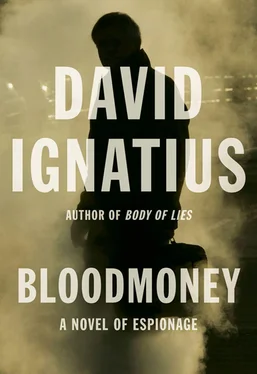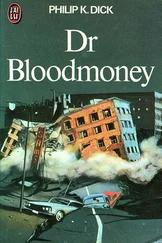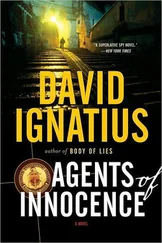David Ignatius - Bloodmoney
Здесь есть возможность читать онлайн «David Ignatius - Bloodmoney» весь текст электронной книги совершенно бесплатно (целиком полную версию без сокращений). В некоторых случаях можно слушать аудио, скачать через торрент в формате fb2 и присутствует краткое содержание. Жанр: Шпионский детектив, на английском языке. Описание произведения, (предисловие) а так же отзывы посетителей доступны на портале библиотеки ЛибКат.
- Название:Bloodmoney
- Автор:
- Жанр:
- Год:неизвестен
- ISBN:нет данных
- Рейтинг книги:4 / 5. Голосов: 1
-
Избранное:Добавить в избранное
- Отзывы:
-
Ваша оценка:
- 80
- 1
- 2
- 3
- 4
- 5
Bloodmoney: краткое содержание, описание и аннотация
Предлагаем к чтению аннотацию, описание, краткое содержание или предисловие (зависит от того, что написал сам автор книги «Bloodmoney»). Если вы не нашли необходимую информацию о книге — напишите в комментариях, мы постараемся отыскать её.
Bloodmoney — читать онлайн бесплатно полную книгу (весь текст) целиком
Ниже представлен текст книги, разбитый по страницам. Система сохранения места последней прочитанной страницы, позволяет с удобством читать онлайн бесплатно книгу «Bloodmoney», без необходимости каждый раз заново искать на чём Вы остановились. Поставьте закладку, и сможете в любой момент перейти на страницу, на которой закончили чтение.
Интервал:
Закладка:
The driver was lighting up a cigarette. Two boys were cursing each other in the street. “Gandu!” said one, using the local slang that means, colloquially, “You faggot!” “ Bahinchod,” roared back the other. “Sister fucker.”
Egan was claustrophobic. He told the taxi driver to stop. His forehead was bathed in sweat. He opened the door, then closed it again. The driver was asking for directions. Come on, think: What were his options? He could get out of the car. He could take another taxi back to the hotel, and be on the plane the next morning.
What address? the driver was demanding again. The little bastard wanted his money.
What would it be? Egan closed his eyes. There was no quitting this one, not now. It was too late, too many plans, too much momentum. He formed the words, just as he had memorized them: 11-22 Gilani Buildings, Sector 2, Baldia Town. He rasped out the address to the greedy driver, and the cab pulled away.
Egan never made it to the pickup site. He just vanished. Overhead surveillance didn’t have a fix on him in the jumble of traffic. Headquarters confirmed from the reconnaissance log later that he had never arrived at the rendezvous. His contact, Azim Khan, had been there waiting for him, right where he was supposed to be in Baldia Town. Overhead showed the Pakistani arriving a little before nine. He waited until after eleven and then left in his chauffeured Mercedes back to his villa in a posh suburb. What did it mean that the Darwesh Khel leader had shown up for the meet? Nobody could be sure then, or for a while after.
They tried to find Egan all night and into the next day. They mobilized a paramilitary rescue team from Bagram, ready to shoot the shit out of everyone in the effort to find him, but they never got close. The Pakistani police were given the GPS coordinates from his BlackBerry, which indicated that he was in Ittehad Town north of the city center. The police moved quickly into that raw neighborhood, but all they found was the phone. It had apparently been discarded on the run, thrown into a dumpster, where the police fished it out.
They never found Egan’s body. It was just gone. That was all you could say. A photo surfaced on a jihadist website, showing a man strapped to a table. There was a cloth over his mouth, and you could see a hand holding an earthen jug, pouring a cascade of water down the man’s throat.
They couldn’t be sure that it was Egan, or even an American. There was just a glimpse of one of his eyes, contorted by suffering and the instant of agony in which the picture was taken. He was dressed in an orange T-shirt. What you could see of the body were the marks from the cigarette burns and the gruesomely precise cuts of the hacksaw. People who saw the picture never forgot it.
5
Jeffrey Gertz spent his last minutes of ignorance in his car, driving over the mountains to work from an appointment with his dentist in Beverly Hills. That was what made him late. The operations center hadn’t wanted to call him until they were sure they had a problem, what with the twelve-hour time difference from Pakistan. And then, when the ops center tried, they couldn’t reach him. So he didn’t get the news that Howard Egan was missing until he got to work. Gertz fired the watch officer later, as if it had been his fault.
It was a June morning, the air so clear and fluffy it might have been run through the washer-dryer. Gertz steered his shiny red Corvette through the downward slope of Coldwater Canyon, chewing sugarless gum and listening to a military history audiobook on the car stereo. It was just past nine, and the sun was streaming into the San Fernando Valley. He was listening to An Army at Dawn, the first volume of Rick Atkinson’s history of World War II. When he was done, he would buy the second volume and listen to that, too. Like every warrior, he wanted a good war.
The cassette ended as he neared Ventura Boulevard. The only sound in the car now was the air-conditioning and the murmur of traffic. Gertz let his mind wander. Maybe The Hit Parade needed a motto, he mused. Every successful organization had one, including secret organizations. “The invisibles: We deliver”…or: “The shadow service: Reinventing intelligence.” He thought about it, and wondered if maybe he should order up a secret logo, as well, with something spooky like a half-moon or a lightning bolt and no words, no explanation at all.
Gertz had a face that was all angles: raised cheekbones; a firm chin; sharp eyes. He had started wearing a goatee a few years ago, to soften his appearance and make him look less like an Army Ranger. He had short brown hair, trimmed once a month by a stylist in Beverly Hills. He had stopped challenging colleagues to do push-ups on the office floor a few years before, but that was mainly because a superior had advised him it was offensive to women and would hurt his career.
Gertz’s nickname had been “Killer” when he joined the agency fifteen years before. People who met him back then weren’t sure whether he had acquired the name because he had actually killed someone, or because he was so ambitious. He had tried to tone down his tough-guy image when he moved to Los Angeles, and had even sought the advice of a wardrobe consultant at a clothier on Rodeo Drive. That was characteristic of Gertz. He studied everything. He wanted to get it right.
Today Gertz was dressed in a royal-blue blazer, a blue so bright it reminded you of a Caribbean cruise, with an open-neck black shirt and a pair of light charcoal slacks. He looked like one of the thousands of people in West Los Angeles who prospered through some connection with what was called “the industry.” When he gave people his card that said “The Hit Parade: Entertainment Is Our Business,” it was almost believable.
When Gertz reached Ventura Boulevard, he turned right at the Ralphs Supermarket. A few shoppers were plodding toward the door. They looked like they hadn’t slept all night. He put in a new cassette. The Allies were on their way to Kasserine Pass.
Sophie Marx was at the office when the news came in from Karachi. She had been at home, trying to get some rest, calling the operations room every few hours to check on Howard Egan’s progress. The watch officer called her when they got the message about the meeting being moved up a day. After that, she couldn’t sleep, so she had come on back. It wasn’t a premonition, exactly, but she knew how worried Egan had been about the trip. She had told him everything would be fine, but in the middle of the night, in her bed in Sherman Oaks, she had remembered what it felt like to be alone in a city where people would kill you, for a certainty, if they knew who you were. That was when she decided to come in.
“Call Gertz,” she said when it was clear that something had happened. The watch officer tried his cell, but by then he was at the dentist’s. It wasn’t anybody’s fault, but this was a day when things went wrong.
Marx waited for the boss with other senior officers who had gathered outside his office on the fifth floor. She was the most junior member of this group. It was only a week before that Gertz had asked her to run counterintelligence for the little organization. The senior staff wasn’t a talky group, even on a good day. They had all spent too many years keeping their mouths shut. The head of Support, a man named Tommy Arden, asked if there was any news yet from the “Death Star,” by which he meant Headquarters. Several people answered no.
Gertz emerged from the elevator with his usual fixed smile, but it vanished in an instant. The watch officer was waiting for him, hovering awkwardly by the elevator door. His name was Julian and he wore an earring. The operations chief, Steve Rossetti, was lurking a little farther on, with the nervous eye of a man who didn’t want to be blamed, along with Arden, the head of Support. Marx wasn’t in the inner circle; she stood farther off. But she was Egan’s contact, so in a sense it was her problem.
Читать дальшеИнтервал:
Закладка:
Похожие книги на «Bloodmoney»
Представляем Вашему вниманию похожие книги на «Bloodmoney» списком для выбора. Мы отобрали схожую по названию и смыслу литературу в надежде предоставить читателям больше вариантов отыскать новые, интересные, ещё непрочитанные произведения.
Обсуждение, отзывы о книге «Bloodmoney» и просто собственные мнения читателей. Оставьте ваши комментарии, напишите, что Вы думаете о произведении, его смысле или главных героях. Укажите что конкретно понравилось, а что нет, и почему Вы так считаете.












